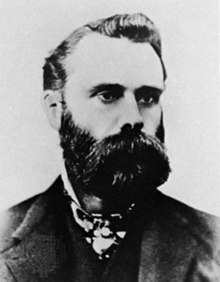Charles Dow
Charles Henry Dow (born November 6, 1851 in Sterling , Connecticut , USA , † December 4, 1902 in Brooklyn , New York , NY ) was an American journalist , economist and editor of the Wall Street Journal .
Life and career
The son of a farmer became a journalist in Springfield , Massachusetts at the age of 21, and three years later in Providence , Rhode Island . At the age of 29, Dow began working at Kiernan News Agency in New York, compiling financial news for banks and brokerage offices . Together with Edward Davis Jones and Charles Milford Bergstresser , he founded the financial news agency Dow Jones & Company in 1882 and, with the Customer Afternoon Letter, published the first stock market letter from which the Wall Street Journal developed.
To get a benchmark for assessing stock price fluctuations, Dow developed the first US stock index , the Dow Jones Railroad Average (now the Dow Jones Transportation Average ). It was first published on July 3, 1884 in the Customers' Afternoon Letter . The Dow Jones Railroad Average initially consisted of 11 values. A year later it became an index based on 14 stocks. It was characteristic of the time that twelve stocks were railroad stocks and only two were industrial stocks.
In 1896, Dow created the Dow Jones Industrial Average , which is still known today, for the Wall Street Journal , adding the prices of the twelve most important stocks on the New York Stock Exchange and dividing the total by twelve. The initial listing was on May 26, 1896 at 40.94 points.
Between 1899 and 1902, Dow published editorials in an attempt to correlate daily stock price changes with a long-term trend . The summary of this became known as the Lable Dow Theory and became the basis of technical analysis .
| personal data | |
|---|---|
| SURNAME | Dow, Charles |
| ALTERNATIVE NAMES | Dow, Charles Henry (full name) |
| BRIEF DESCRIPTION | American journalist, economist, and editor of the Wall Street Journal |
| DATE OF BIRTH | November 6, 1851 |
| PLACE OF BIRTH | Sterling , Connecticut |
| DATE OF DEATH | 4th December 1902 |
| Place of death | Brooklyn , New York , NY |
